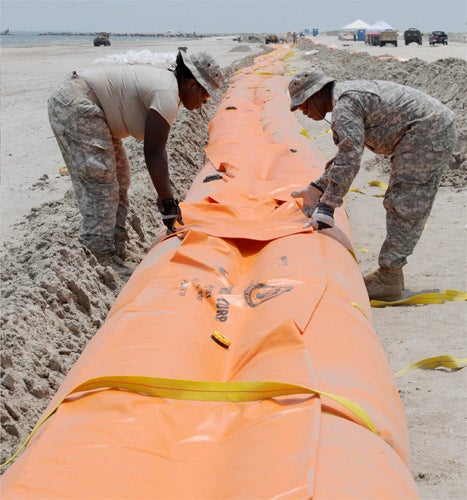Courts overturn Obama's ban on deep-sea drilling

Your support helps us to tell the story
From reproductive rights to climate change to Big Tech, The Independent is on the ground when the story is developing. Whether it's investigating the financials of Elon Musk's pro-Trump PAC or producing our latest documentary, 'The A Word', which shines a light on the American women fighting for reproductive rights, we know how important it is to parse out the facts from the messaging.
At such a critical moment in US history, we need reporters on the ground. Your donation allows us to keep sending journalists to speak to both sides of the story.
The Independent is trusted by Americans across the entire political spectrum. And unlike many other quality news outlets, we choose not to lock Americans out of our reporting and analysis with paywalls. We believe quality journalism should be available to everyone, paid for by those who can afford it.
Your support makes all the difference.A judge in Louisiana delivered a blow to President Barack Obama last night, overruling his six-month ban on deep-sea oil exploration in the wake of the BP blow-out on 20 April that killed 11 men and spawned America's worst environmental disaster ever. The White House said it would appeal the decision.
The courtroom drama came on the same day that Russia said President Dmitry Medvedev would seek reassurances from the British Prime Minister, David Cameron, at a G8 meeting in Canada at the weekend that the oil disaster will not damage the Russian economy. BP, which may restructure to cope with the costs of the spill, accounts for 25 per cent of the oil extracted in Russia.
"We want to see how this situation will affect the overall strategy of BP and how it may affect joint ventures in Russia. We want to have some guarantees it will continue to work," Yuri Fedotov, the Russian ambassador to the UK, said last night.
The ruling in Louisiana was welcome news for oil giants and for companies that support the industry. The moratorium has idled at least 33 rigs already in place drilling deep-water wells in the Gulf basin, and some companies have been pondering repositioning equipment elsewhere, including off Brazil.
The federal judge, Martin Feldman, said he could see no justification for closing down all deep-sea operations by all companies because one well leased by one company had gone awry. The moratorium seemed "capricious and arbitrary". He added: "The court is unable to fathom a relationship between the findings and the immense scope of the moratorium."
Uncertainty about deep-water drilling will persist pending the White House appeal, however. "The President strongly believes that continuing to drill at these depths without knowing what happened does not make any sense, and puts the safety of those involved and the environment in the Gulf at a danger that we cannot afford," said the White House chief spokesman, Robert Gibbs.
The ruling was in response to a suit by Hornbeck Offshore Services which was joined by more than 20 other companies seeking to reverse the drilling ban. Judge Feldman said the implementation of the ban was illegal. Oil industry leaders attending a conference in London had earlier condemned the moratorium.
"There are things the administration could implement today that would allow the industry to go back to work tomorrow," Steven Newman, the chief executive of Transocean, the company that owned the doomed rig, told reporters.
Join our commenting forum
Join thought-provoking conversations, follow other Independent readers and see their replies
Comments